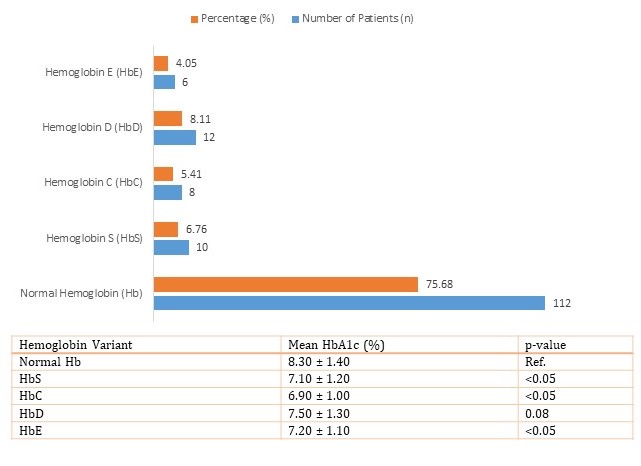Impact of Hemoglobin Variants on HbA1c Results in Diabetic Patients
A Study from Pakistan
DOI:
https://doi.org/10.62497/IRJMB.89Keywords:
Hemoglobin variants, HbA1c, Diabetes, glycemic control, hemoglobinopathies, PakistanAbstract
Background: The accuracy of HbA1c readings may be greatly impacted by hemoglobin variations, which may cause diabetes patients' glycemic control to be misclassified.
Objective: To assess the impact of hemoglobin variants on HbA1c results in diabetic patients in Pakistan and determine potential discrepancies in HbA1c measurement methodologies.
Methodology: This cross-sectional study was conducted at the University of Sialkot, from January 2023 to December 2023. The HbA1c values of 148 diabetic individuals were determined by high-performance liquid chromatography (HPLC). Variants in hemoglobin were found, and their effects on HbA1c levels were examined. Independent t-tests were used for statistical comparisons, and p-values less than 0.05 were deemed significant.
Results: Hemoglobin variations were present in 36 (24.32%) of the 148 patients, with the most prevalent being HbD (8.11%), HbS (6.76%), HbC (5.41%), and HbE (4.05%). In contrast to patients with HbS, HbC, and HbE, who had considerably lower values of 7.10 ± 1.20% (p < 0.05), 6.90 ± 1.00% (p < 0.05), and 7.20 ± 1.10% (p < 0.05), respectively, patients with normal hemoglobin had a mean HbA1c of 8.30 ± 1.40%. Compared to patients with normal hemoglobin (25%, p < 0.05), those with variations had a higher chance of being categorized as well-controlled (50%).
Conclusion: Variants in hemoglobin may cause HbA1c levels to be underestimated, which might misclassify glycemic control in diabetic patients. This emphasizes the need of using different glucose monitoring techniques in those who are impacted.

Additional Files
Published
Issue
Section
License
Copyright (c) 2023 Authors

This work is licensed under a Creative Commons Attribution-NonCommercial 4.0 International License.
